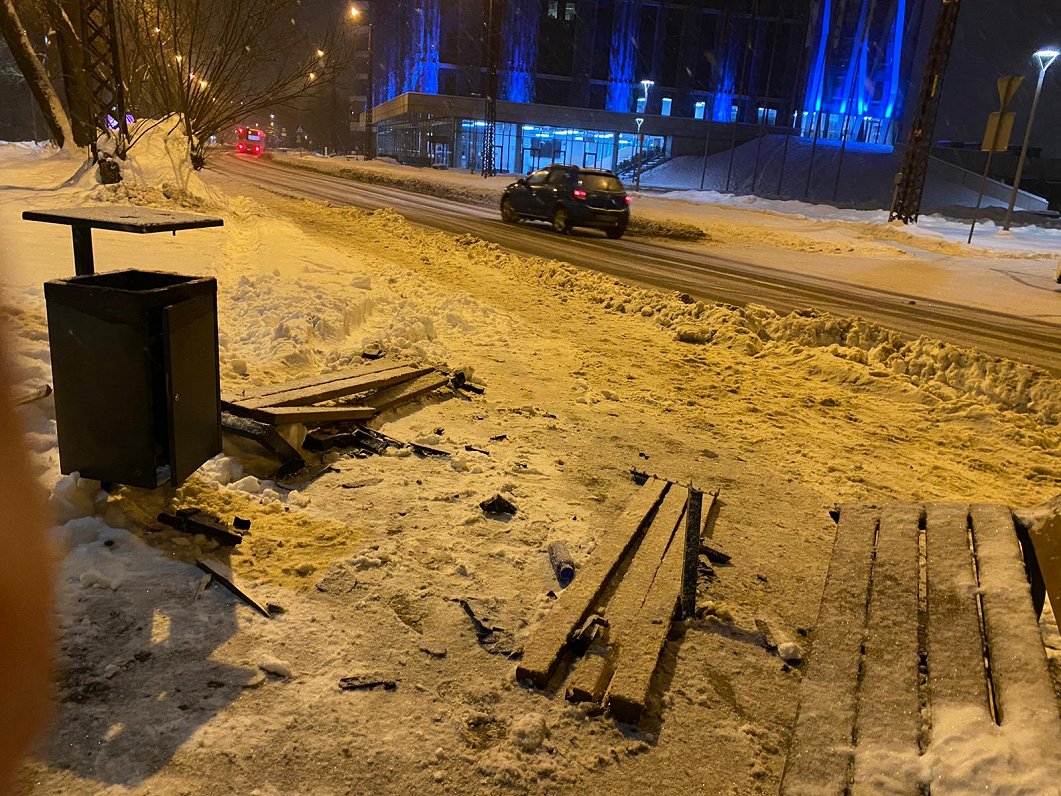A road traffic accident occurred on December 9 last year in Jelgavas Street, Riga, in which a vehicle hit a girl and then another person on an unregulated pedestrian crossing. The accused did not reduce the speed promptly and did not stop the vehicle before the pedestrian crossing but kept driving forward and didn't give way to a pedestrian who at that point was crossing the street.
As a result, an underage girl was hit and dragged for a few meters. The defendant's vehicle drove off the carriageway of Jelgavas Street and onto the pavement, where it continued to drive along it until another person was hit. As he drove off the pavement, the vehicle hit a bench.
The man accused in pre-trial criminal proceedings, born in 1932, does not fully admit his guilt, noting that he does not remember the traffic accident at all.
According to information available to the Latvian Radio News Service, the accused in this criminal case is 91-year-old Jānis K. The old man faces a prison sentence of up to eight years and deprivation of driving license for up to five years. The man was granted a non-custodial measure. The prosecution did not disclose what it was.
In the pre-trial criminal proceedings, the accused did not fully admit his guilt, stating that he had no memory of the accident. The prosecutor is convinced that there is sufficient evidence in the case to confirm the driver's guilt of the charges against him.
The accused refused to speak to Latvian Radio News Service. His lawyer, Kristaps Zaķis, told the court that the accident was tragic, but that his client did not admit guilt. The next court hearings are scheduled for July 1 and 15.
After the first hearing, there was a meeting attended by the deceased girl's mother, Valentīna Kučinska, the accused and lawyers for both parties. The parties agreed on the possibility of a settlement.
The victim's lawyer, Aleksejs Ponomarjovs, said that there was "communication with both the accused and his lawyer. We agreed on the possibility of concluding a settlement and compensation for the moral damages. Unfortunately, I cannot elaborate on the content of the settlement, but in essence, we received an apology for the harm done and we agree on the possibility of concluding such a settlement."
The offer to enter into a settlement was made by the accused himself.
Are senior drivers checked sufficiently?
According to the Road Safety Directorate (CSDD), more than 37,000 drivers in Latvia over the age of 75 have a driving license. More than 9,000 of them have been banned from driving because they have not passed a health check.
More than 400 people over the age of 90 currently hold a valid driving license, including a 101-year-old citizen.
Drivers must have a medical check-up every three years after the age of 60.
"A person comes to the commission. He has to fill in a questionnaire about his state of health or what medication he is taking, and whether he has any problems, and then he goes to all seven doctors of the commission. [...] He goes to an eye doctor, an ear doctor, a neurologist, a narcologist, a psychiatrist, a traumatologist-surgeon and a therapist, who is the main doctor, the last doctor of the medical commission, who also signs the report for the client," Inese Vectirāne, head of the Medical Commission of the Latvian Samaritan Association working for the CSDD, explained the procedure.
Andris Baumanis, a general practitioner, said that there have been cases when he refused to issue medical certificates to seniors.
"There are several patients - I'll talk about my practice right away - for whom I refuse to issue a medical certificate and even to pass a commission, saying their illnesses are incompatible with driving a car. I have patients like that, and I refuse them and explain that he should not be behind the wheel - because of cardiological problems and so on. So what do these patients do? Then they go to the health center, pay the money, and, most likely, get this certificate [after going through a commission] with seven specialists, because these seven specialists in the medical commission do not have any medical information about what this patient has had, what events have happened," said doctor Andris Baumanis.
"Let's say a patient has been unwell behind the wheel three times, has called an ambulance, has ended up in hospital because of some cardiological problem, but the specialized medical committee has no data on this particular patient. Only the GP has such data in his outpatient card," the doctor explained.
According to Andris Baumanis, this problem exists all over the world. In Latvia, it could be solved if there was a centralized e-health system with all the data on each patient.
State Police data show that the number of crashes involving people over 75 years of age increased between 2021 and 2023. In both 2021 and 2022, almost 600 accidents involving drivers in this age group will be recorded.
Last year, there were almost 700 such crashes, and between January 1 and May 15 this year, there were almost 200.
The State Police has statistics on the number of people aged 75 and over involved in road accidents, but no specific data on how often older drivers cause crashes.
Andris Kulbergs (United List), a Member of the European Parliament, pointed out that statistics on serious traffic accidents in Latvia are very incomplete.
"We have no information on accidents at all. 55% of the accidents are listed in the statistics as unknown fault or criterion. So there is speed, drunkenness, etc., but 55% of the accidents are without any identification. [...] These statistics are so incomplete that they are distorted, they cannot be trusted," the MEP said.
After the crash on Jelgavad Street, a discussion started on social networks about whether people over 90 should be allowed behind the wheel.
Several members of the Saeima confirmed to Latvian Radio News Service that the issue had not been discussed in parliamentary committees. Andrejs Judins, a deputy from the New Unity party, said that he was against the introduction of such a ban, but that there could be talk of seniors having more frequent medical examinations.
However, it is up to the medical profession to come up with such an initiative, according to Andrejs Judins.
"Every driver has a medical check-up. Perhaps the solution would be not to impose a ban, but to do it more often. In principle, it would hardly be right to simply mechanically link a ban to age. [...] Plus not only the test, but perhaps we should also review the criteria and if it is found that [a person] has some kind of illness, some kind of reaction, then perhaps we should also restrict the possibility of driving. In principle, the main work here is for health professionals. When they can formulate the criteria directly, then we can amend the legal side of it," said Judins.
The Ministry of Health, the Association of Family Doctors or the Association of Health Centres do not plan to propose more frequent health checks for seniors over 90.
Already now, a doctor can order a medical check-up at least every year, according to a specific situation assessment - this is provided for in government regulations. If a patient is given a medical certificate for a year, the doctor must justify why this decision was taken. This must be stated in the electronic system and in the patient's outpatient record and explained to the patient.























